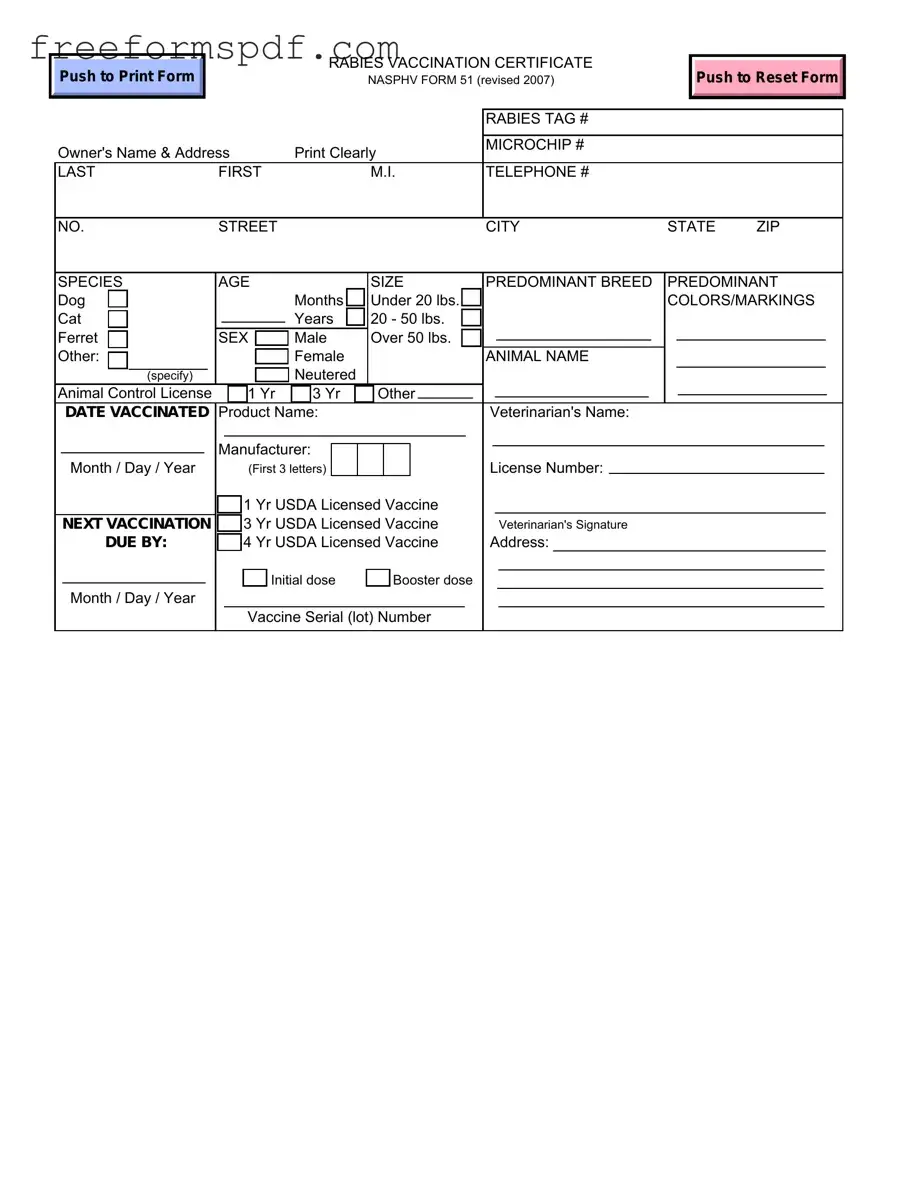Fill in a Valid Rabies Certificate Template
Common mistakes
-
Illegible handwriting: Filling out the form with unclear handwriting can lead to miscommunication. Ensure that all information is printed clearly to avoid any confusion.
-
Missing information: Omitting crucial details such as the owner's name, address, or animal's information can result in delays or issues with the certificate. Double-check that every required field is completed.
-
Incorrect dates: Entering the wrong date for vaccination can cause problems. Always verify the date of vaccination and the next due date to ensure compliance with vaccination schedules.
-
Wrong species or breed: Misidentifying the animal's species or breed can invalidate the certificate. Take care to accurately describe the animal to avoid complications.
-
Not using the correct rabies vaccine: Make sure to use a USDA licensed vaccine and indicate the correct product name on the form. Using an unapproved vaccine can lead to legal issues.
-
Incomplete veterinarian information: Failing to provide the veterinarian's name, license number, or signature can render the certificate invalid. Ensure all veterinary details are included and accurate.
-
Not specifying neutering status: Indicating whether the animal is neutered or spayed is important. If this information is omitted, it may lead to misunderstandings regarding the animal's health.
-
Ignoring the rabies tag number: The rabies tag number is essential for tracking vaccinations. Be sure to include this number as it is often required for registration and compliance.
Learn More on This Form
-
What is a Rabies Certificate?
A Rabies Certificate is an official document that verifies a pet has been vaccinated against rabies. It includes important information such as the pet owner's details, the animal's description, vaccination dates, and the veterinarian's information.
-
Why is a Rabies Certificate important?
This certificate is crucial for public health and safety. It helps ensure that pets are vaccinated against rabies, a deadly virus that can affect both animals and humans. Many states and localities require proof of rabies vaccination for pet licensing and travel.
-
What information is required on the Rabies Certificate?
The certificate must include:
- Owner's name and address
- Animal's species, age, size, and breed
- Microchip number (if applicable)
- Date of vaccination
- Vaccine product name and manufacturer
- Veterinarian's name and license number
- Next vaccination due date
-
How often does my pet need to be vaccinated for rabies?
The frequency of rabies vaccinations can vary based on local laws and the type of vaccine used. Typically, pets receive their initial vaccination, followed by booster shots every one to three years, depending on the vaccine's duration of immunity.
-
Can I use a Rabies Certificate for travel?
Yes, many airlines and states require a Rabies Certificate when traveling with pets. It is essential to check the specific requirements of your destination, as regulations may differ.
-
What should I do if I lose my Rabies Certificate?
If the certificate is lost, contact your veterinarian. They can provide a replacement or a new certificate, as they keep records of vaccinations administered.
-
Is the Rabies Certificate the same as a pet license?
No, a Rabies Certificate is not the same as a pet license. The certificate proves vaccination against rabies, while a pet license is a legal requirement for pet ownership in many areas. However, a rabies certificate is often needed to obtain a pet license.
Misconceptions
Understanding the Rabies Certificate form is crucial for pet owners and veterinarians alike. However, several misconceptions often arise regarding its purpose and requirements. Here are four common misconceptions:
- Misconception 1: The Rabies Certificate is only needed for travel.
- Misconception 2: Any veterinarian can issue a Rabies Certificate.
- Misconception 3: A Rabies Certificate is valid indefinitely.
- Misconception 4: The form is the same for all animals.
Many people believe that the Rabies Certificate is solely a travel document. In reality, this certificate serves as proof of vaccination and is often required for local licensing and health regulations, not just for travel purposes.
While many veterinarians can administer rabies vaccinations, not all are authorized to issue the Rabies Certificate. Only those who use USDA-licensed vaccines and meet specific state requirements can provide this certification.
Some pet owners assume that once they receive a Rabies Certificate, it remains valid forever. However, the certificate's validity depends on the vaccination schedule. Most vaccines require boosters every one to three years, so it is essential to keep track of these dates.
It is a common belief that the Rabies Certificate form is uniform across all species. In fact, different animals may require specific information and documentation. The form must accurately reflect the species, age, and vaccination details pertinent to the individual animal.
Browse More Forms
Mortgage Interest Statement - The statement indicates whether any escrow funds are allocated for taxes and insurance purposes.
When engaging in a motorcycle transaction, having the right documentation is crucial, and the New York Motorcycle Bill of Sale form serves this purpose effectively. This legal document not only outlines the specifics of the sale but also protects both parties involved. To enhance your understanding and ensure a smooth process, you can find valuable resources like the one provided by NY Templates.
New Ncoer - It includes sections for rater and senior rater authentication.
What Is a P45 Form - Employees should familiarize themselves with how to use their P45 for tax returns effectively.
